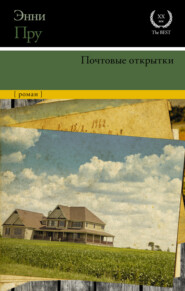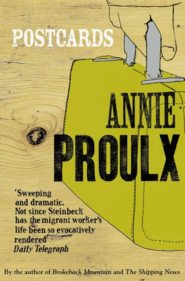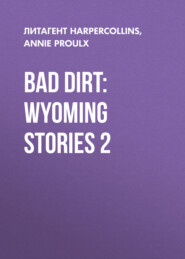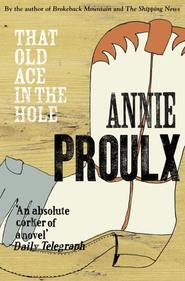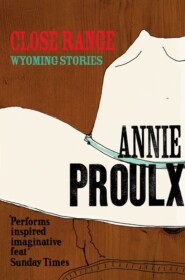По всем вопросам обращайтесь на: info@litportal.ru
(©) 2003-2024.
✖
Настройки чтения
Размер шрифта
Высота строк
Поля
“She had collected all Dad’s obituaries she could find. She never said a word to us. Kept them in a big envelope marked ‘Our Family.’ I never knew if she meant that sarcastic or not. The usual stuff about how he was born in Nebraska, worked for Union Pacific, then for Ohio Oil and this company and that, how he was a loyal Pathfinder. One said he was survived by Lottie Forkenbrock and six children in Chadron, Nebraska. The boy was named Ray. Another said his grieving family lived in Dixon, Wyoming, and included his wife Sarah-Louise and two sons, Ray and Roger. Then there was one from the Casper Star said he was a well-known Pathfinder survived by wife Alice, sons Ray and Roger, daughters Irene and Daisy. That was us. The last one said his wife was Nancy up in LaBarge and the kids were Daisy, Ray and Irene. That was four sets. What he done, see, was give all the kids the same names so he wouldn’t get mixed up and say ‘Fred’ when it was Ray.”
He was breathless, his voice high and tremulous. “How my mother felt about this surprise he give her I never knew because she didn’t say a word,” he said.
He swallowed his whiskey in a gulp and coughed violently, ending with a retching sound. He mopped tears from his eyes. “My sisters bawled their eyes out when they read those death notices and they cursed him, but when they went back home they never said anything,” he said. “Everybody, the ones in LaBarge and Dixon and Chadron and god knows where else kept real quiet. He got away with it. Until now. I think I’ll have another whiskey. All this talking kind of dries my throat,” he said, and he got the bottle himself.
“Well,” said Beth, trying to make amends for misunderstanding, “at least we’ve got this extended family now. It’s exciting finding out about all the cousins.”
“Beth, they are not cousins. Think about it,” he said. He had thought she was smart. She wasn’t.
“Honestly, I think it’s cool. We could all get together for Thanksgiving. Or Fourth of July.”
Ray Forkenbrock’s shoulders sagged. Time was swinging down like a tire on the end of a rope, slowing, letting the old cat die.
“Grandfather,” said Beth gently. “You have to learn to love your relatives.”
He said nothing, and then, “I loved my father.
“That’s the only one I loved,” he said, knowing it was hopeless, that she was not smart and she didn’t understand any of what he’d said, that the book he thought he was dictating would be regarded as an old man’s senile rubbish. Unbidden, as wind shear hurls a plane down, the memory of the old betrayal broke the prison of his rage and he damned them all, pushed the tape recorder away and told Beth she had better go back home to her husband.
“It’s ridiculous,” Beth said to Kevin. “He got all worked up about his father who died back in the 1930s. You’d think there would have been closure by now.”
“You’d think,” said Kevin, his face seeming to twitch in the alternating dim and dazzle of the television set.
I’ve Always Loved This Place (#u3b464ad1-4d22-56fb-87c2-b85909521042)
Duane Fork, the Devil’s demon secretary, rushed around readying the suite of offices. He sprinkled grit and dust on the desktops, gravel on the floor, pulled closed the heavy red velvet drapes and sprayed the room with Eau de Fumier. Precisely on the dot of midnight he heard the familiar hoof steps coming down the hallway and drew up to attention.
“Good morning, sir,” said Duane obsequiously.
“Merde,” grunted the Devil, looking around with a peevish eye. “This place is—unspeakable.” He had just come back from the Whole World Design & Garden show in Milan, where he posed as an avant-garden-furniture designer who worked in crushed white paper. “If it gets rain-spotted and grimy, who cares? Just kick it into the barbecue and burn it up,” he advised. But all the while his guts were twisting with jealous desire as he looked at plastic poolside sofas, walkways beneath pleached tree boughs, tropical palm gardens, rock grottoes and cantilevered decks. On the way back to Hell he leafed through half a dozen design glossies, filled out the subscription blank for Dwell and thought briefly of starting a rival publication to be called Dwell in Hell. Studying the magazines, he understood that his need was more for landscaping, riverside parks and monuments than for architectural design.
“Nothing has been done with this damn place for aeons. It’s old-fashioned, it’s passé, people yawn when they think of Hell. Slimy rocks and gloomy forests do not have the negative frisson of yesteryear—there are environmentalists now who love such features. We need to keep up with the times. Modernize. Expand and enlarge. We’ve got to enlarge now that our Climate Rehab Program is working—deserts, melting glaciers, inundations. We’re starting to look frumpy in comparison. And, Duane, all signs in the Human Abode point to a major religious war on the way; if we don’t get ready for an influx we’ll have a vexing problem.”
On the way home from the design show he had also read a japish piece in a screed that called itself The Onion pretending to report on the addition of a tenth circle to accommodate an increasing number of Total Bastards, most of them American businessmen. The Devil had smiled. A tenth circle was not a bad idea, but Hell’s coming population increase would demand much more than providing quarters for tobacco lobbyists and corporate executives. In the long run there was probably no need to build an extension; since nearly all humans were inevitably damned, a simple inversion would do, much like turning a length of intestine inside out and using it as a sausage casing. The earth itself, with no labor on his part, would become Hell Plus. In the meantime he intended to upgrade the current facilities.
“Today, Duane, we are going to tour the property and see where we can make improvements. I want you to bring your notebook. Andiamo!” They set out on a red golf cart, the Devil wearing only his shooting jacket, Duane, an eyeshade.
On the way the Devil tossed out infomercial nuggets he had absorbed from his study of the magazines. “It’s not so much that we want to tear things down and start over with restructuring, bulldozers, topsoil and fill and imported rocks. What we want is to see the potential in what’s already here and work with that. The basic bones of the place are good. We know that. We’ll use a construction outfit that has worked in Iraq—Rout & Massacre sounds like our kind of company. Give them a call and get an idea of their fees. If they are too high we’ll forcibly transfer them here and make them a local company.”
At the main gate the Devil rolled his eyes.
“Got to keep the sign,” he said. “You can’t really improve on that last line, ‘ABANDON HOPE, ALL YE WHO ENTER HERE!’ But the gate is boring. Without the sign it’s just another Romanesque stone gate. But if we replace it with something modern like the St. Louis arch and an electric fall—”
Duane Fork’s furrowed brow and wry face indicated confusion.
“What’s the matter?” asked the Devil. “You prefer pepper spray?”
“Oh no! I guess I just don’t know what an electric fall is.”
“Heard of a waterfall, haven’t you?”
“Yessir.”
“An electric fall is the same thing, but with electricity, not water. Of course we could mix them—that make you happy?”
“I’m happy with whatever you want to do, sir.”
“Good. Make a note. Entrance Gate—St. Louis arch with electrified waterfall.”
At the river the Devil cracked a few jokes with Charon but had no suggestions for enhancing the crossing process after the old man snarled “Fine just the way it is.” Charon’s hot-coal eyes winked spasmodically. He smote five or six naked wretches with his oar and said, “You remember to pick up my eyedrops?”
“Damn!” said the Devil. “I forgot again! Next time for sure. Try sticking your head in the river.” He floored it and they drove away from the riverbank, whizzed through the suburb of Limbo.
“Bor-ring,” said the Devil, glancing at the writers and poets standing around the film producers, the scribblers holding manuscripts and talking up their ideas.
At the second circle, the source of the dark-and-stormy-night literary genre and a warehouse for marital cheaters, the Devil bawled, “Close the wind vent, Minos, it’s wrecking my coif.” As they drove he switched on the golf cart’s headlight and recognized a few of the adulterous spirits maledict. “How they hangin, baby?” he said, slapping Paris on the rump. Duane Fork dared to lick Cleopatra’s left breast. Ideas for reshaping this corner of Hell did not come; it was cast in stone that adulterers would puke and heave in permanent nausea; it would be a waste of time to design anything more than the concrete gutters already in situ.
It was not until the third circle that the Devil came alive with inventive eagerness. Cold rain and sleet hammered down on soil the consistency of a decayed sponge. Figures writhed in the mud. The Devil paused to hear some of the latest gossip which came in a hundred languages. The hoarse, desperate howling of Cerberus echoed from the black cliffs.
“Bad boy! Bad boy!” shouted the Devil encouragingly as he tossed the creature a handful of meatballs. Multiple heads snapped at the flying treats, none escaping the triple throat. Cerberus barked out thanks and a bit of news.
“Did you know that about Sarkozy?”
“No sir,” said Duane, taking a note.
“We can do something here,” said the Devil. “What we need are all those things that made New Orleans so great—slippery car tops, floating boards with protruding nails, a lot of sewage in the water, conflicting orders. Or maybe a tsunami once in a while. The place seems made for a classy tsunami. And I would like a heavy miasma to hang over everything. This ground fog is almost worthless.” He looked at the Stygian rock slopes streaming with black water. “Hell, the view alone is worth billions. Breathtaking. I’ve always loved this place.”
The golf cart lurched through the mire. They skirted the great marsh that prefaced the river Styx, but the sounds of the damned choking on silty mud carried through the humid atmosphere like hundreds of hogs at the trough. On the far shore they could see an unbelievably steep mountain and on its peak the city of Dis outlined against a fiery sky. At the boat landing the Devil whistled shrilly, and in the distance they saw the boatman Phlegyas poling toward them.
“You know, this is really Charon’s job, but I put him on the Acheron because he’s got a maître d’ personality—ushers in the newcomers with style. And Phlegyas is good enough at what he does.” The powerful boatman lifted the golf cart into the vessel and they set out across black water crowded with floundering swimmers whose numbers impeded the boat’s progress.
“Take a note, Duane. We want to put two or three hundred saltwater crocs in here. Order them from Australia. Double our fly-gnat-mosquito-chigger package order.”
Once landed at the base of the mountain, the Devil made a frame with his fingers and held it up against various vistas. He kept coming back to the city at the top.
“Location, location,” he murmured. “And we’ve been wasting it all this time. It is the ideal end point for the Tour de France. Pro cyclists have earned a place in Hell. It is twice the size of any Alp.” They set off up the steep slope, swerving around the boulders on the path.
“Just what I thought. Soft and easy. Let’s take a page from the Paris-Roubaix race, erroneously called ‘the Hell of the North.’ Let’s get some coarse and broken cobbles on the steepest stretches here. I want those guardrails removed from the abyss, and plenty of flints and Clovis points protruding from the final five kilometers. Varied weather will help; sleet storms, parching heat, black ice on the cobbles, hurricane force crosswinds and a few thousand clones of that German so-called Devil guy who dresses up in a smelly red union suit and runs around with a cardboard pitchfork, the jerk. He’s been looking at too many old woodcuts and I’ve got a place for him some sweet day. Every rider will be on drugs and some will go down frothing at the lips like Simpson on Mount Ventoux in nineteen sixty-whatever. And let’s have screaming crowds who throw buckets of filth and fine dust, handfuls of carpet tacks, who squirt olive oil and then piss on the riders. Water bottles filled with kerosene or alkali water. Riders have to fix their own bikes and carry spare tires around their necks. If they fall off and break an arm or leg no one can help them. More dogs on the course. And rattlesnakes. Let’s see—how about an obligatory enema in the starting gate and EPO breaks every thirty minutes? As for the UCI—” He whispered in the demon’s ear.
“Chapeau!” cried Duane Fork.
At the city of Dis the Devil told the enraged and tormented inhabitants to get ready for big-time bicycle racing. Gliding down through the next circles the Devil decided on a number of presidential suites modeled on Japanese hotel cubicles and Wal-Mart men’s rooms, added a slaughterhouse nightclub and made the decision that after a newcomer passed through the gate and was discharged by Charon into the main Welcome to Hell foyer he or she would find combined features of the world’s worst air terminals, Hongqiao in Shanghai the ideal, complete with petty officials, sadomasochistic staffers, consecutive security checks of increasing harshness, rapidly fluctuating gate changes and departure times and, finally, a twenty-seven-hour trip in an antiquated and overcrowded bucket flying through typhoons while rivets popped against the fuselage.
On the climb up to Dis the Devil had noticed a cluster of scorched bowlegged men lollygagging near a boiling water hole. This area was posted as a reserve for Italian Renaissance politicians. Trespassing was forbidden.
“I’ll be damned,” he said. “That’s Butch Cassidy and some of his old gang. Cheeky bastards. Let’s plan something good for all the old rustlers and cowboys who have made it over the winding trail. I think we’ll give them a taste of their own medicine. Let’s get the Four Horsemen and some of our assistant imp riders and start herding those cowboys into bunches, cutting them out and moving them into pens. We’ll rope and throw them, castrate, vaccinate and brand them with my big Pitchfork iron. Oh, there’ll be plenty of dust and bawling and pleas. They’ll try to break away. They will screech and gibber. In the end we’ll turn them in to a sand pasture full of cheatgrass, goat-heads, cockleburs and ticks. They can ride the bicycles discarded by the tour racers and listen to Slim Whitman doing ‘Indian Love Call’ over the loudspeaker.”
“Ranchers, too?” asked Duane Fork.






